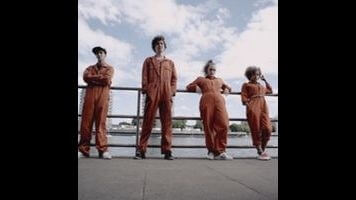One of the most common uses of speculative fiction on television is when it’s held up as a mirror for society. The Twilight Zone was almost nothing but that, but it’s still an important part of the genre’s DNA, even as shows have become more narrative-based and serialized than the original anthologies. The early seasons of Buffy The Vampire Slayer, so clearly a predecessor of Misfits, may have been the peak of this, as it famously used metaphor to comment on the anxieties of high school and growing up.
It fails because it never really comes to grips with the fact that Finn had his girlfriend tied up in his room for, apparently, weeks. And while the fact that she manipulated him is bad, it’s not as bad as kidnapping. Yet the show elides this. Within a day, Sadie is able to work on forgiving Finn. The show has made one of its core characters, who is supposed to be at some level entertaining and/or likeable, into an utter creep, well beyond early Simon, Nathan, or Rudy. Perhaps you can compare it to Alisha’s abuse of her power early on, but she was called out on her abuses and seemed to learn something. By the end here, Finn looks like he’s the good guy.
Theoretically, Sadie’s use of her power to change Finn’s mind is as much of an abuse as Alisha’s—she removes his ability to think for himself and consent to his actions. But, in one of the worst decisions Misfits has ever made, we never actually see her use that power. It is far too easily plausible that she never had that power, that all she did was convince Finn to do what she wanted by virtue of the fact that they’d been in a codependent relationship for so long and she knew how to manipulate him. Only the flash of light when Seth took her power indicated that it was a real power instead of the stereotypically normal power of female manipulation. It is far too easy to perceive her as a caricature, and Finn as a criminal abuser, for the show to simply shrug off.
Despite my discomfort at this aspect of the episode, I’m still willing to give Misfits the benefit of the doubt, for a few reasons. First, one of the consistent themes running through the show—or perhaps, running through viewers’ ability to embrace the show—is that the addition of powers makes traditional ethical concepts based on rationality and equality obsolete. The Misfits’ first ever act is to kill their probation worker and hide the body, which under most systems would make them terrible people—but given that the storm turned him into a homicidal maniac, it’s fully explicable. So Sadie did have a power, and she was using it, so perhaps within context of the show, kidnapping her isn’t conventional “kidnapping.”
The second and perhaps most important reason I’ll give Misfits the benefit of the doubt is that the show is trying to directly engage with difficult issues. I don’t like the way it ignored Finn’s kidnapping, but I was still able to see and understand what the show was trying to do in depicting young people’s codependent relationships. I felt for Finn when he was trying to avoid dealing with the breakup and couldn’t even leave the room. It’s a scene of real, awkward power and it could have been something truly special had I been able to overlook the fact that neither he nor Sadie treated a multi-week kidnapping with any depth.
Finally, I’m willing to give Misfits another chance (or three, or six…) because I know it’s not just willing to try to confront these issues, I know it has succeeded at dealing with them. The Curtis/Melissa episode in season three had, perhaps, an even higher level of difficulty, and I thought it succeeded marvelously. But I also know that for other people, it didn’t. When this show tries something big, it does so in a way that won’t work for everybody. That wasn’t me this time. Maybe it wasn’t anybody. But there was enough there to work with that it could have worked, it could have been superb, and perhaps the next time Misfits tries to do something so ambitious, it will work.
Stray observations:
- “Whoa! Please. I find your objectification of men more than a little offensive.” I’m starting to see Rudy as the personification of male insecurities—and, given his actual defense of Curtis over his quest for sex, he seems to be bettering himself. Then again, which side of the cling-wrap faced which way?
- “He took mine. Twice. Fucking mistake. Both times.” Love it, Curtis.
- “About two pound 86 pence?”
- Two new characters are giving us some lingering/spooky camerawork. What’s up with Alex and Lola?

 Keep scrolling for more great stories.
Keep scrolling for more great stories.
